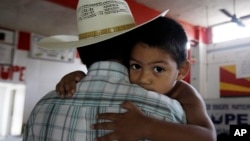A constitutional amendment passed nearly 150 years ago to give U.S. citizenship to freed slaves has become a hot-button issue in the 2016 presidential campaign.
Last week, leading Republican presidential contender Donald Trump unveiled his campaign’s immigration plan, including a controversial proposal to end granting “birthright citizenship” – automatic citizenship to any child born on U.S. soil.
After the Civil War ended in 1865, the U.S. Congress passed, and the states later ratified, the 14th Amendment, which was designed to grant citizenship to, and protect the civil liberties of, newly emancipated slaves.
Trump, and several other Republican candidates, takes issue with the automatic granting of citizenship to children born to undocumented migrants.
Trump said he doesn’t believe the amendment grants American citizenship to such children, whom he calls “anchor babies,” a term many consider to be derogatory.
'Take too long'
He has said “it would take too long” to amend the constitution but would seek a court review of the amendment as president.
"This [birthright citizenship] remains the biggest magnet for illegal immigration," Trump’s policy paper states.
Suzanna Sherry, professor of law at Vanderbilt Law School in Nashville, Tennessee, said Trump has only two options to address the 14th Amendment: amend it or persuade the Supreme Court that previous interpretations of the law are incorrect.
Amending the U.S. Constitution is an arduous process, requiring a two-thirds majority vote in both the Senate and House of Representatives, and then approval by three-fourths of U.S. states.
“The Supreme Court has never explicitly ruled on whether people who are born here [in the United States] of undocumented parents are citizens, but the language of the amendment is pretty clear,” Sherry said.
She cited the first line of the 14th Amendment: All persons born or naturalized in the United States, and subject to the jurisdiction thereof, are citizens of the United States and the state wherein they reside.
Pointing to history, Sherry said the 14th Amendment’s intent was to ensure that African-Americans were considered citizens of both the United States and the state in which they lived.
The 1857 Dred Scott case had ruled that African-Americans were not citizens of a state.
Can't take rights away
In general, “Congress is permitted to give citizenship to anybody it wants, but it is not permitted to take citizenship away from somebody the constitution gives it to,” she said.
“Of all the amendments to the constitution that have to do with rights, all but one expanded rights,” Sherry said. “The only one that contracted rights was Prohibition – the 18th Amendment that banned alcohol. But it was repealed 25 years later.
“That history tells us something,” she said, “about whether we should be amending the constitution that contracts rights.”
Polly J. Price, a law professor at Emory University School of Law in Atlanta, said most scholars believe you have to amend the constitution to take away the automatic award of citizenship at birth.
Price added that most people don’t understand the potential administrative nightmare that would be created by repealing the 14th Amendment.
Repeal would affect everyone, Price said, adding that anyone in the U.S. needing to prove their citizenship – when applying for a driver’s license or a Social Security number, for example – would be required to prove their parentage.
“Under the proposal, if you repeal it [the amendment], then I have to prove that one of my parents” was a U.S. citizen or permanent resident, she said.
To prove that status, someone would need their parent’s birth certificate, and “the farther back you go, the harder it is to prove that,” Price said.
Many countries have poor record-keeping, meaning birth records may be hard to produce. Also, someone may not know much about their parent’s background, she said.
Issue of statelessness
Getting rid of the amendment would also create problems of statelessness for both long-term undocumented migrants and their children born in the U.S., Price said.
In terms of deportation, a country of origin may not claim an undocumented migrant who has lived in the U.S. for a long time, she said, and a parent’s country of origin may not deem a child born in the U.S. as a citizen of their country.
“There are a lot of problems with being stateless,” she said.
In recent days, Trump and fellow Republican candidate Jeb Bush have been criticized for using the term “anchor baby.”
Migrants' rights groups say the term is offensive and used by anti-immigration activists to describe U.S.-born children of undocumented migrants, usually from Latin America.
During a campaign event Monday, Bush denied the phrase was offensive, and said he was talking specifically about cases “of fraud being committed where there's organized efforts -- frankly it's more related to Asian people coming into our country, having children in that organized effort, taking advantage of a noble concept, which is birthright citizenship.”
Asian-American leaders have called on Bush to apologize for the comment.
Federal agents earlier this year described "maternity tourism" schemes in which wealthy foreign women, particularly from China, travel to the United States to give birth so their children will have U.S. citizenship.
Several other Republican candidates have joined Trump in calling for the repeal of birthright citizenship for children of undocumented migrants, including South Carolina Senator Lindsey Graham, Louisiana Governor Bobby Jindal, Kentucky Senator Rand Paul and former Pennsylvania Senator Rick Santorum.
But some Republican candidates oppose such a move, including Carly Fiorina, who said last week, “It would take passing a constitutional amendment to get that [birthright citizenship] changed. … Let us focus our political energies on doing what the government is responsible for doing, secure the border, and fix the legal immigration system.”
Births
Over the weekend, Trump’s campaign claimed more than 400,000 children of undocumented migrants are born in the U.S. and receive citizenship each year.
Jeffrey Passel, a senior demographer with the Pew Research Center, told PolitiFact.com, an independent fact-checking journalism website, that number may have been accurate about 10 years ago, but he now estimates about 300,000 children are born each year in the U.S. to undocumented migrants.
The Pew Hispanic Center, a nonpartisan research group, estimated 340,000 of the 4.3 million babies born in the United States in 2008 were the offspring of unauthorized migrants, according to its analysis of U.S. Census Bureau data. It concluded that 8 percent of babies born in the United States that year had at least one undocumented migrant parent.
Trump’s immigration policy also includes rescinding President Barack Obama's executive orders on immigration, which would deport millions of unauthorized migrants, and building a wall across the U.S.-Mexico border, which Trump said he would get Mexico to pay for.
Old World vs. New World
Of the nearly 200 countries in the world, the United States is one of only about 30 that grant citizenship status to any child born within its borders, according to NumbersUSA, which describes itself as a nonprofit, nonpartisan group that favors reduced immigration.
Emory law professor Price said countries in the Western Hemisphere – the U.S., Canada, Latin and South America – have similar birthright citizenship laws.
What makes America unique in this category, she said, is the U.S. law is embedded in its constitution.
There are no European or Asian countries on NumbersUSA’s list that offer birthright citizenship.
Historically, countries such as the U.S. or Canada needed to attract settlers, Price said, "so it was just a practice for newcomers to be citizens."
She described the difference in laws between the Western and Eastern hemispheres as "kind of a New World vs. Old World concept."
However, there are some countries, such as Britain or Germany, that offer a form of birthright citizenship that requires at least one of the child’s parent’s be a permanent resident of the country.
A bill with similar language was introduced into the U.S. House in 2009.
The Birthright Citizenship Act of 2009 would have eliminated birthright citizenship for children born to undocumented migrants in the U.S.
Under the bill, which did not make it out of committee, only a child with at least one parent who is a U.S. citizen, a legal permanent resident, or an undocumented migrant serving in the military would be considered a U.S. citizen.










